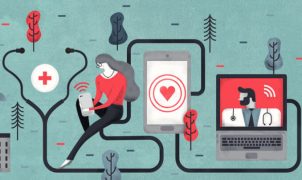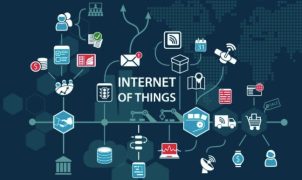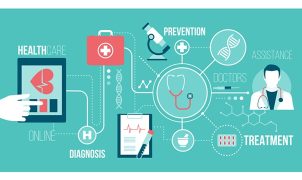1. What is Health Digital Transformation?
Health digital transformation is the comprehensive application of technology and communication in the healthcare industry to optimize management, information storage, and enhance the quality, efficiency, and user experience.
Digital transformation in the healthcare sector involves the use of electronic health records, mobile applications, management systems, and advanced technologies. Key components of the fourth industrial revolution include digital technologies such as big data, IoT, cloud computing, artificial intelligence, robotics, and virtual reality.

2. What is Digital Health?
Digital health, also known as “Digital Health,” is the field that utilizes digital technology to improve health management, diagnosis, treatment, and healthcare services. Digital health combines information technology, mobile applications, sensors, artificial intelligence, machine learning, and various other technologies to provide advanced solutions in healthcare. Technologies driving digital transformation in healthcare include modern applications and tools.
Technologies driving digital transformation in healthcare include:
- Electronic Health Records (EHR): EHR allows electronic storage, management, and sharing of patient health information, increasing efficiency and reducing errors in patient record management.
- Telehealth and Telemedicine: Telehealth enables remote medical consultations and healthcare advice through video calls, phone calls, and mobile applications, providing convenient access to healthcare services.
- IoT and Connected Health Devices: Internet of Things (IoT) in healthcare links health devices to the internet to collect health data. Smart blood pressure monitors, health watches, and health sensors help monitor and manage personal health.
- Machine Learning and Artificial Intelligence (AI): Machine learning and AI analyze complex health data, aid in diagnosis, predict disease trends, and generate personalized treatment solutions.
- Mobile Health Technology Applications: Mobile applications enable patients to manage health, schedule appointments, and receive information about medications or follow-up appointments.
- Blockchain Technology in Healthcare: Blockchain is used to secure health information and ensure data security in patient data sharing.
Digital health is driving improvements in healthcare management, access to healthcare services, and optimizing diagnosis, treatment, and prediction in the healthcare sector.
3. Role of Digital Transformation in Healthcare
3.1. For the Public:
Digital health transformation aims to create favorable conditions for the public to use healthcare services conveniently, interact easily with healthcare staff for feedback and guidance, and manage personal health through connected health data with healthcare facilities. The ultimate goal is to ensure that everyone owns an electronic health record.
The Fourth Industrial Revolution has brought many opportunities and benefits to digital health transformation. In fact, transformation improves personalized healthcare for the public. It plays a crucial role in saving patients’ lives, especially in emergencies requiring immediate intervention. New technologies such as electronic records and linked health information systems enhance the sharing of health information between care facilities, providing important, accurate information for diagnosis and treatment.
3.2. For Healthcare Professionals:
Through technology application, doctors can easily access the latest medical knowledge and techniques, enhancing patient safety and healthcare quality. Digital transformation also minimizes the risk of errors in healthcare processes, ensuring accuracy and reliability in health information management.
With electronic health records and health information management systems, patient information is now easily accessible and shareable among doctors and healthcare facilities. This allows easy interaction and communication among healthcare experts, facilitating effective consultation and advice.
Furthermore, the goal of digital transformation in healthcare is to ensure that every hospital and healthcare facility has electronic health records. This ensures that patient records and related health information are connected across healthcare facilities, providing a more comprehensive view of patients and facilitating the sharing of critical information across healthcare levels.
3.3. For Healthcare Managers:
Digital transformation in healthcare brings many improvements in health management and care services. Through technology application, healthcare managers can effectively deploy coordination, monitoring, alerting, and forecasting activities related to public health issues. This enhances the ability to detect and respond to community health issues quickly and accurately.
Digital transformation also plays a crucial role in streamlining the administrative procedures of the healthcare industry and deploying online public services. The adoption of online applications and systems helps reduce complexity in procedures and waiting times, while providing more convenient healthcare services for the public. This also strengthens access and efficiency in healthcare service delivery.
Moreover, digital transformation provides many useful applications for hospital and healthcare facility managers. These applications help manage compliance with procedures, treatment protocols, and deploy activities to improve service quality for patients and healthcare staff.
4. Current Status of Digital Transformation in Healthcare in Vietnam
According to a study by the Ho Chi Minh City University of Economics, in recent years, especially during the COVID-19 pandemic, Vietnam, particularly Ho Chi Minh City, has controlled and stabilized the situation. However, the impact of the pandemic remains significant and is an unforgettable period. In terms of applying information technology and digital transformation in epidemic prevention work, Ho Chi Minh City has created innovative and effective products that are noteworthy.
An exemplary case is the COVID-19 patient management system developed and launched by the Ho Chi Minh City Health Department in March 2022. Before the system, thousands of people visited healthcare centers to declare they had COVID-19 (F0), and many others waited to receive certificates confirming the completion of home isolation. Thanks to this digital tool, the city has effectively addressed the congestion of patients at healthcare centers, minimized the risk of cross-infection in the community, and significantly reduced pressure on the healthcare system.
Apart from that, many hospitals in Ho Chi Minh City have successfully applied digital transformation in their management and operation. There is an increase in the application of technology in patient management, examination, and treatment, which has shown positive results.
In the face of the COVID-19 pandemic, digital transformation in healthcare has played a vital role in Vietnam, contributing to the successful prevention and control of the epidemic. The country has been proactive in adopting and developing digital health solutions, and the experience gained during the pandemic is expected to further accelerate the digital transformation of the healthcare sector in Vietnam.
























































































































































